|
|
|
Sort Order |
|
|
|
Items / Page
|
|
|
|
|
|
|
| Srl | Item |
| 1 |
ID:
185968
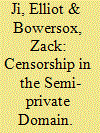

|
|
|
|
|
| Summary/Abstract |
Previous work addressing China’s censorship regime has primarily focused on public information from social media sites and not information shared more intimately. This article focuses on semi-private information and its impact on collective action, using an original experiment to test established censorship theories in this overlooked domain. The results suggest that censors treat information critiquing the government and calling for collective action with equal hostility, unlike in the public domain in which the former category is more likely to be disregarded. Further, this article finds evidence of human involvement in semi-private domain censorship. This study aims to complement existing literature on authoritarian control of information with a view to the regime’s effort to prevent collective action and political opportunities that can be exploited by dissent.
|
|
|
|
|
|
|
|
|
|
|
|
|
|
|
|
| 2 |
ID:
170121
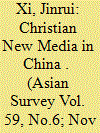

|
|
|
|
|
| Summary/Abstract |
WeChat provides an unprecedented and vibrant platform for Christians in China to publicize their faith on a scale never seen before, thus serving as a powerful vehicle for transporting information between the church, the society, and the state, mitigating the prevailing information problem that has long handicapped these relations.
|
|
|
|
|
|
|
|
|
|
|
|
|
|
|
|
| 3 |
ID:
182948


|
|
|
|
|
| Summary/Abstract |
This article explores a facet of the Chinese propaganda apparatus that has yet to receive sufficient academic attention: the murky ecosystem of “semi-official” party-state presences on Chinese social media. With a particular focus on WeChat public accounts, this investigation responds to two critical research questions: first, what differentiates official party-state social media presences from semi-official presences, and second, what unique role do semi-official WeChat accounts play in the contemporary Chinese propaganda apparatus? This article samples content published by five dyads of official and semi-official WeChat public accounts during the first fifteen days of June 2019. The results of this comparative, case-study-based discourse analysis support two conclusions. First, semi-official WeChat accounts posture as independent from the party-state in order to attract large followings and gain credibility. Second, semi-official WeChat public accounts operate as “astroturfed influencers,” enabling the Chinese propaganda apparatus to covertly manipulate online discourse with extraordinary efficiency.
|
|
|
|
|
|
|
|
|
|
|
|
|
|
|
|
| 4 |
ID:
180527
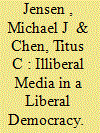

|
|
|
|
|
| Summary/Abstract |
The regime of censorship in the People’s Republic of China (PRC) extends beyond its borders through the extraterritorial application of its media regulations to popular social media platforms like WeChat. This research investigates the effects of the PRC’s extraterritorial control of online content on the identity narratives and norms communicated by comparing Australia’s Special Broadcast Service (SBS) Mandarin language news and the news targeting Australian audiences published on popular WeChat Official Accounts (OAs). We find significant differences in the news content between these two platforms: SBS provides more political content and a focus on political and cultural integration, while WeChat pages tend to avoid political topics that are not otherwise press releases from the PRC and they encourage strong cultural ties with Mainland China. Finally, SBS tends to both inform and cultivate democratic political identities and identification with the Australian political system, whereas WeChat tends to differentiate the Chinese diaspora from the wider Australian community. We situate these findings within a wider understanding of PRC’s national security strategies and doctrine. Whether by requirement or practice, not only the WeChat OAs in Australia implement PRC’s communication controls, but the content on these pages also challenges the liberal democratic practices and norms and supports foreign influence and espionage in Australia.
|
|
|
|
|
|
|
|
|
|
|
|
|
|
|
|
| 5 |
ID:
179290
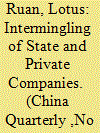

|
|
|
|
|
| Summary/Abstract |
This paper examines the relationship between political events and information control on WeChat through a longitudinal analysis of keyword censorship related to China's 19th National Communist Party Congress (NCPC19). We use a novel method to track censorship on WeChat before, during and after the NCPC19 to probe the following questions. Does censorship change after an event is over? What roles do the government and private companies play in information control in China? Our findings show that the system of information control in China can trigger blunt reactions to political events. In addition to critical content around the Congress and leaders, WeChat also censored neutral and potentially positive references to government policies and ideological concepts. The decision making behind this censorship is a product of the interaction between the government, which influences actions through directives, and the companies, which ultimately implement controls on their platforms. While this system is effective in compelling companies to implement censorship, the intermingling of the state and private companies can lead to outcomes that may not align with government strategies. We call for a deeper understanding of the role of private companies in censorship and a more nuanced assessment of the government's capacity to control social media.
|
|
|
|
|
|
|
|
|
|
|
|
|
|
|
|
| 6 |
ID:
182979
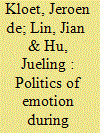

|
|
|
|
|
| Summary/Abstract |
In this article, we analyse the most popular stories that circulated on WeChat public accounts concerning personalized experiences of COVID-19 in China during the first three months of 2020. Among these non-fictional online writings, we probe into ‘individual’ and mediated experiences with the coronavirus in China by questioning the visualizations and discourses of these stories and their producers, as well as the concomitant emotions they invoked. Parallel to the changing situation of the pandemic, we observe a diachronic evolution of emotions, from fear and doubt to (nationalist) pride. While articulating personalized experiences of the pandemic from disparate perspectives, the stories invariably built on, and were shaped by, the workings of the WeChat public account platform (公众平台) as evidenced by its content moderation logic and political economy. The analysis shows that emotions, rather than facts, propel the popularity of these stories. The measures taken by the state are mostly applauded, and only sometimes questioned; tragic memories are rewritten, and a political and economic order is consolidated.
|
|
|
|
|
|
|
|
|
|
|
|
|
|
|
|
| 7 |
ID:
162090
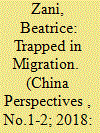

|
|
|
|
|
| Summary/Abstract |
How do Chinese migrant women fight against economic and social disqualification to find their place in Taiwanese cities and in the Taiwanese labour market, after a double migratory ordeal firstly within China and then from China to Taiwan, where they face situations of double-discrimination? This empirical study of three urban spaces and one rural village in Taiwan shows the capacity of those women to face domination by developing creative strategies of survival and resistance. The plurality of the economic activities women can produce proves the emergence of transnational economic spaces between the Chinese society of departure and the Taiwanese society of arrival that contribute to bottom-up globalisation.
|
|
|
|
|
|
|
|
|
|
|
|
|
|
|
|
|
|
|
|
|